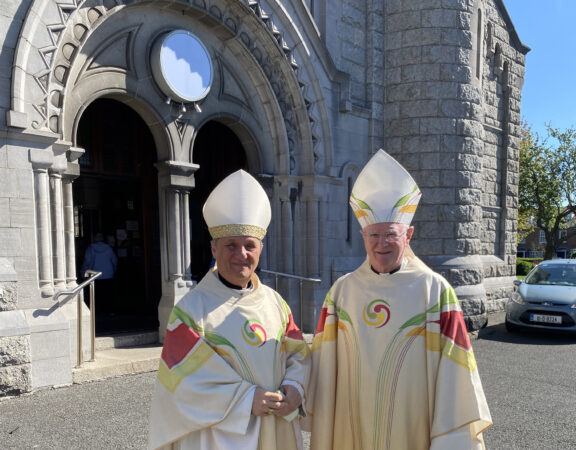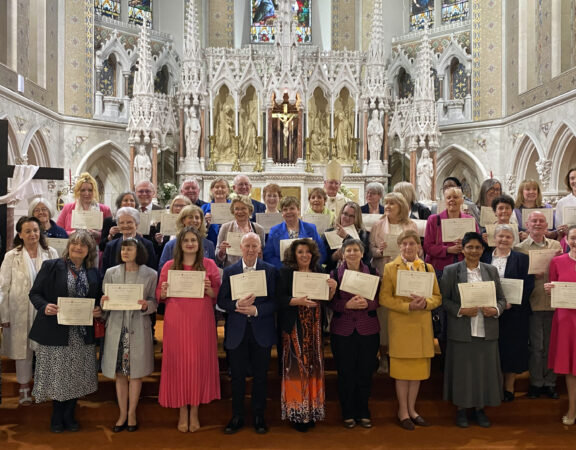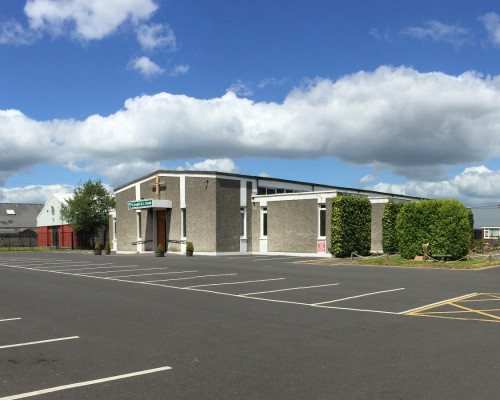Mass for the Association of Papal Orders in Ireland
Church of the Holy Rosary, McKee Barracks, Dublin
24th February 2023
“Lord, I am not worthy that you should enter under my roof, but only say the word and my soul shall be healed.” These words of the Mass, recited when the priest shows the people the Host, come from this evening’s Gospel (Luke 7:1-10). They bring us to the heart of the reality of our relationship with Jesus, and to the heart of the power that Christ has: the power to heal—to heal our soul, in other words to heal our very lives.
The centurion sent emissaries to ask Jesus to heal his slave. Even though the centurion is a person of power and influence, and is accustomed to ordering people about, he does not regard himself as worthy to command Jesus to come to him and heal his slave. As a person of power, the centurion, knows both the dynamics of power and the limits of his own power. He trusts that in Jesus another power is at work: a power that he needs for his slave, the power to heal, and he knows how to ask for it.
In the world of the centurion, the Roman world, trust—in Latin, fides—is a key value. It is the fides that soldiers have in their centurion that makes all the difference in battle. For the centurion, because of their fides in him, they “go the extra mile” even to the point of giving their lives, not for the distant emperor, but for their local commander whom they respect and in whom they have confidence.
The way fides worked provided the early Christian generations a framework that helped them understand and explain what God had done, and continued to do, for them in Christ. Christ was the one who made the difference, the one who changed their perspective, who brought them—to use the imagery of recent Sunday Gospels—to turn the other cheek, to go the second mile, to be reconciled with their sister or brother, if they had anything against them (see Matt 5:23–24, 38–48).
To have fides in Christ is to trust; it is to have hope, it is to turn one’s heart to the Lord. It means to root one’s life, to ground and centre one’s concerns in God. There are other horizons for one’s hopes, one’s trust, one’s fides: it is possible to turn one’s heart to human things, to root one’s entire life, to ground and centre one’s concerns, in the things of this world, in wealth, fame, power, honour, or pleasure.
The centurion in tonight’s Gospel trusts not only that Jesus has power to heal his slave, but he will do so on behalf of a ‘foreigner’—an agent of an occupying force, an “enemy,” if you will. He is willing to trust, to believe, to have faith. True disciples do not get caught up in their own ideas. If one has the gift of faith, then the doors of hope can open. Faith opens new spaces for God to reveal himself to us.
Jesus is astonished at the centurion’s trust in him—his fides, as we might say his faith; “I tell you, not even in Israel, have I found such faith”—such trust, such confidence. The high praise of Jesus for the centurion reminds us that faith resides in both Jew and Gentile, in friend and opponent. It also says to us that the centurion understood that genuine authority and power are from God, and God’s authority transcends the artificial divisions that we set up between ourselves as servants and commanders, or Jews and Gentiles. God has authority over all of us. We are called to trust in him. It is this trust that transforms.
In many ways becoming a disciple of Christ, answering his call to “come after him” (Matt 4:19), was—to use the words of one scholar—“throwing in one’s lot with Christ; [it is] an act of trust; an act of hope; a risk.” This demands much more than accepting a new set of beliefs or concepts: it requires commitment to God and Christ, in thought, emotion, and action. The faith that saves—and this is what we see in this evening’s Gospel—demands the “forging of a [new] relationship.” It is this new relationship with God, with Jesus, with the slave, and with the community that we see in action in the story of the Centurion and his slave.
This new relationship—brought about by God in Christ—is the manifestation of a new life. The gospel has a name for this new life: it calls it salvation. Salvation is an expression of the transformation wrought by this new relationship, a relationship with Christ and God that necessarily must be a living one. Our call as disciples is not just to exist, but to embrace a life that welcomes the gifts of God, and shares the life of Christ that has been given us.
The centurion and his confidence in Jesus are not without import for anyone invested as a Papal Knight. Ask yourself, what is the most important thing in your life as a Papal Knight? What is your ultimate concern? The Scriptures consistently set this out as an either/or. For example, when Joshua lays it on the line for the people of Israel: “Do you serve the Lord or some other gods? (Joshua 24:15). Jesus—another Joshua—challenges his disciples, “Either you are with me or you are against me” (see Rev 3:15, Matt 12:30). Each person has to answer with clarity the question, whom do I serve?
The heart of Christian mission is communion with the Lord who, in the Spirit, and through his Church, continues to speak to our lives, from the inside out, as the Gospel of Ash Wednesday so strongly underlines (see Matt 6:1–6, 16–18). Without this rootedness in the life of Christ which is given us, our activity—no matter how well intentioned, is in danger of being reduced to diffuse activism. As Pope St John Paul II put it, “working for the kingdom means acknowledging and promoting God’s activity, which is present in human history and transforms it” (Redemptoris Missio, 15). The Church’s charitable work is guided by faith that works through love (see Gal 5:6), not inspired by ideologies or strategies aimed at improving the world. The Church’s charitable work is the work “of a heart that sees … that sees where love is needed and acts accordingly” (see Pope Benedict XVI, Deus Caritas Est, 31 and 33). The challenge for Knights is to maintain a careful balance between the work of God and your work, between the kingdom and your responsibility of acting for justice, for peace and for environmental sustainability. This—to use the memorable phrase of Pope Benedict—is “the Christian’s programme—the programme of the Good Samaritan, the programme of Jesus.” (ibid.) This is what being a disciple of Jesus entails.
The first task then for Papal Knights and Dames is to witness to the life of Christ, with its hope, tenderness, and good news, for all people, especially the fragile, the “crushed reed and the faltering wick” all around us (see Isa 42:3). In other words, be attentive to those who may be broken in body or in spirit. Like the servant of the Lord in the First Reading (Isa 42:1-4. 6-7), you embody the compassion of God. Isaiah speaks of the gentle manner of the “chosen one”; he does “not cry out or shout aloud, or make his voice heard in the street.” Where there is a spark of justice that is in danger of being snuffed out, it is gently fanned back into a flame.
So, like the Servant be champions of the poor and be promotors of justice and mercy. Here I am not thinking of detached justice. For the Christian, justice must be leavened with love, and equity, complemented by gratuitous giving (Pope Benedict XVI, Caritas in veritate, 36 and 39). The bestowal of a Papal Knighthood is not only a recognition of all that you have accomplished, but also an important reminder or your responsibility to demonstrate in your lives what God’s justice looks like.
In a world where the things of God are more and more forgotten or marginalised, or deemed insignificant, let us discover anew our unity in faith, our oneness in “throwing our lot in with Christ,” for the sake of the little ones, the invisible, and indeed—in our weakness and unworthiness—for our own sake. “Lord, I am not worthy that you should enter under my roof, but only say the word and my soul shall be healed.”
Dermot Farrell
Archbishop of Dublin









